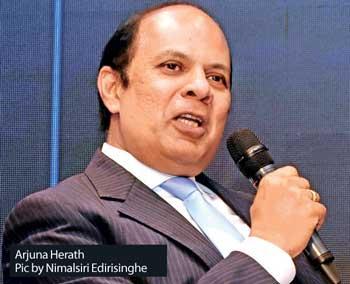20 Sep 2019 - {{hitsCtrl.values.hits}}
 By Shabiya Ali Ahlam
By Shabiya Ali Ahlam
Global leader in advisory services, Ernst & Young said Sri Lanka’s SMEs sector urgently requires the establishment of a ‘Credit Guarantee Corporation’, so that it receives the much needed boost, as current efforts taken by authorities are not reaching this budding sector.
EY Senior Partner Arjuna Herath while pointing out that in the current operative environment the SME sector is observed to be struggling to sustain and grow, implied that a more responsible approach is required to support these businesses that are spread island-wide.
“One of the urgent needs is to form a ‘Credit Guarantee Corporation’. This will be a substitute to the collateral issue that would allow banks to manage that extra provision on lending to SMEs,” said Herath presenting his views on a panel discussion at the Sri Lanka Economic Summit 2019.
Proposed by Finance Minister Mangala Samaraweera in the Budget 2019 was a ‘National Credit Guarantee Institution’ for SME entrepreneurs. Supported by the Asian Development Bank (ADB) loans offered to this sector would be at low interest rates of 1 to 2 percent. It was said that the government would subsidize 75 percent of the monthly installment of the loan. The EY partner stressed that access to finance is the most significant challenge SMEs are faced with today as they borrow at the highest rate, at about 17 to 18 percent, while having thin margins. “We need to find a way to sort this out. If top conglomerates are struggling with interest rates, imagine what the SMEs are going through,” questioned Herath.
He also said that although repeatedly highlighted are the number of efforts taken and concessions made available to uplift the SME sector across the country, in reality, seldom such benefits are enjoyed by the sector as it almost always never reaches them.
“The government actually gives lot of incentives in the form of funding and concessionary interest rates, but it doesn’t reach them.
“Why isn’t it reaching them is an issue we are trying to probe into. If you go to the periphery and ask SMEs if they have got the funding, you will hardly find any,”
shared Herath.Furthermore, he noted that witnessed is “a very significant inconsistency” in terms of rules and regulations, which also requires urgent emphasis and a realistic action plan.
Sri Lanka’s SME sector accounts for 52 percent of the GDP and contributes 45 percent to the overall employment. Over 75 percent of enterprises in the country are from this sector.
14 Nov 2024 50 minute ago
14 Nov 2024 2 hours ago
14 Nov 2024 2 hours ago
14 Nov 2024 2 hours ago
14 Nov 2024 3 hours ago